Last Updated on January 23, 2024
I’ve been contemplating my motto recently. Why do I feel so strongly about ditching perfection? Why do I continuously preach grace?
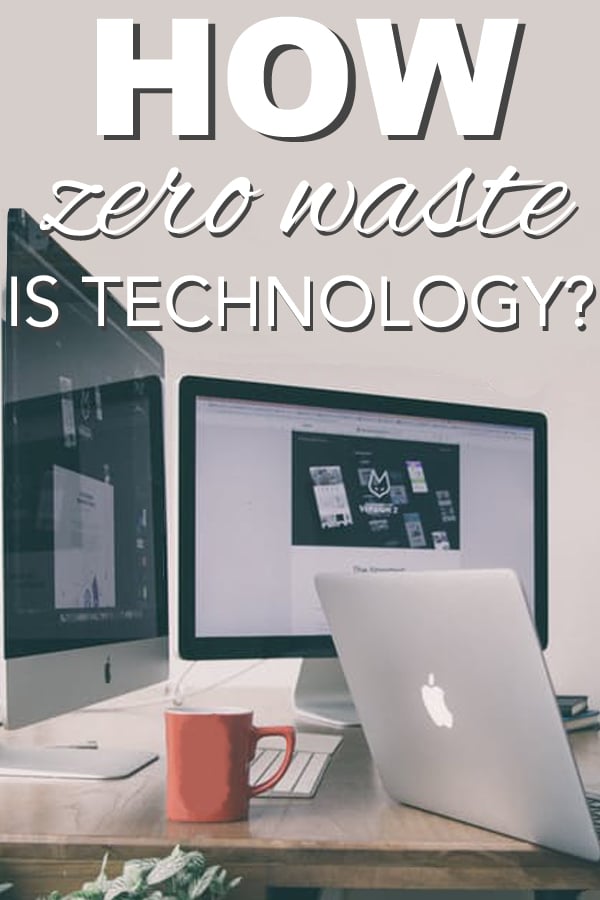
It’s because I am far, far from perfect.
Yesterday, I started freaking out about how much energy I consume at home. I was concerned about the amount of energy used to heat my home, how much energy it took to run lights or my stove.
I was jamming to some old records, and I started thinking about music streaming services online. I started thinking about all those servers and the energy they use. What does that do to the environment?
Focusing on landfill trash is great! But, it’s not the true essence of the zero waste movement.
Trash is a physical representation of the resources we’ve used, albeit a very small sample of the large picture, but a physical representation none the less.
No, the true essence of the movement is to redesign the system so that resources don’t have to be discarded.
Rather they can be resumed back into the system like in nature. So, where does that put us with technology?
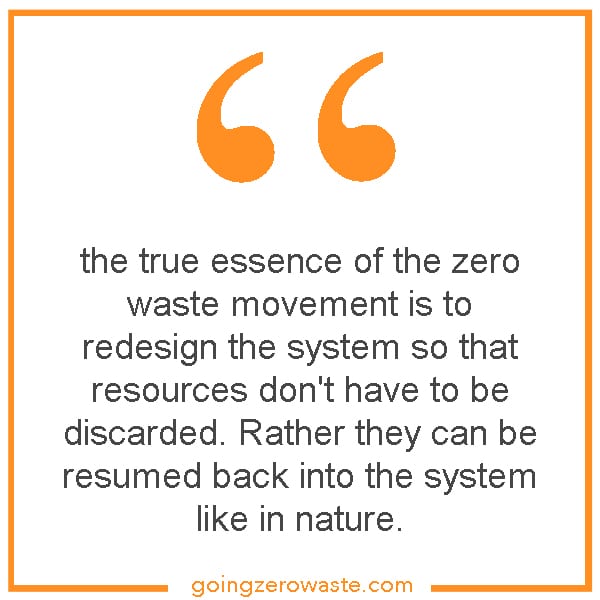
- E-waste is the most rapidly growing segment of the municipal solid waste stream.
- E-waste contains many valuable, recoverable materials such as aluminum, copper, gold, silver, plastics, and ferrous metals. In order to conserve natural resources and the energy needed to produce new electronic equipment from virgin resources, electronic equipment can be refurbished, reused, and recycled instead of being landfilled.
- E-waste also contains toxic and hazardous materials including mercury, lead, cadmium, beryllium, chromium, and chemical flame retardants, which have the potential to leach into our soil and water. (1)
That second point makes it sound like recycling is great! And, while it’s true that you should never landfill electronics, recycling isn’t the answer. As we’ve discussed before.
Most e-waste is dropped off in developing countries where they don’t have proper recycling processes. Instead, they strip it of precious metals (if they can) and leave the hazardous materials lying around.
We’re also depleting the earth very quickly of the rare-earth minerals used to make electronics. This will definitely be an issue in the future of the industry. (2)
On top of the e-waste think about how many servers it takes to run your cloud, your Netflix binge, your Spotify. Think about the amount energy it takes to stream music, movies, and websites.
Technology has made my life simple, streamlined. I no longer have to own and fill my space with tons of copies of books, DVDs, and CDs. But, on the other hand, what’s the environmental impact of relying on servers?
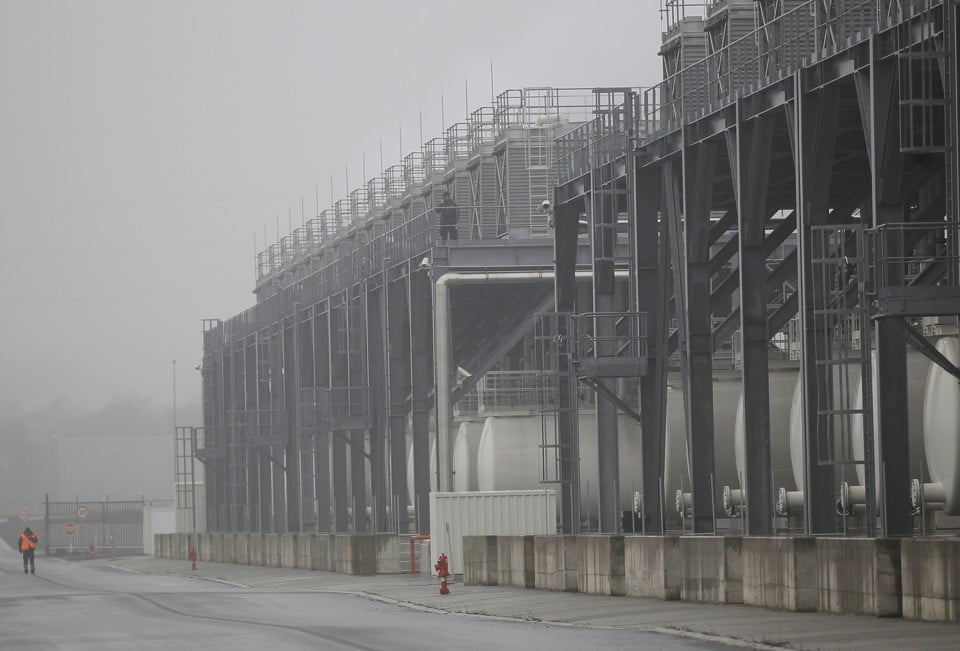
Tanks containing coolant for servers at a Google Data center in Saint Ghislain, Belgium. Image via The Atlantic
It’s really made me question whether or not minimalism applies to this area. We need more libraries, we need to have a larger sharing economy. We need to really focus on reducing in so many aspects.
We need to reduce what we have to what we truly love and cherish. We need to reduce the amount of time we spend bingeing Facebook, Spotify, and Netflix.
I used to keep Netflix or Spotify on in the background. Even if it was a CD or record that I already owned, it was more convenient to play it on Spotify.
Instead of defaulting to Spotify or Netflix, I’m going to make sure that I’m listening and truly enjoying these streaming services with intention.
It will no longer be background. I will no longer mindlessly participate in these activities.
That’s a really sobering thought as you mindlessly scroll through your facebook feed. Sometimes I waste 20 minutes looking at facebook. Why?
I don’t know. I don’t get anything out of it. This will definitely help me be conscious in the future.
I don’t think there is one correct answer here. Rather we might need to reframe our intentions and reassess our consumption. After all, the first R of zero waste is reduce.
I think the internet provides us with great resources and is a wonderful tool. We just need to be more conscious of the amount of time we spend and make sure that we’re truly engaged and present with what we’re doing.
Do you think we’ll be able to move to all renewable energy for streaming services? What do you think about the role the internet and electronics play into waste?
take away points:
This is a very text heavy post compared to most my writing so I want to make a few things clear.
- Technology is amazing. I am for it.
- Be intentional with technology and actively engaged with what you’re using. If you want to marathon 8 hours of Netflix go for it. Just try to be engaged while you do it and not spend hours scrolling through social media simultaneously.
- Instead of getting caught up in the never ending Facebook feed black hole, try and set certain times for checking social media. That way you don’t get sucked in, but can still connect with friends and family.
- Relax and remember everything in moderation.
And, I’m guilty of all of these things. Living with more intention is one of my goals for 2017 (especially focusing on my technology and data consumption.)
I’ve definitely noticed a lack of work life-balance since blogging is something I can do almost anywhere.
FYI: The irony of you reading this on my blog is not lost on me. But, I am considering migrating to WordPress where I can host my blog with clean energy. If you’re a blogger you should check out Green Host It.
I also recently switched my search engine to Ecosia.org. They plant trees while you search. 🙂
further reading:
(1) https://www.kdheks.gov/waste/forms/solidwaste/ew105-ks_elec_waste_standards.pdf
http://www.theatlantic.com/technology/archive/2015/12/there-are-no-clean-clouds/420744/
http://time.com/46777/your-data-is-dirty-the-carbon-price-of-cloud-computing/


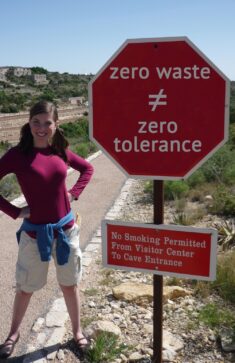







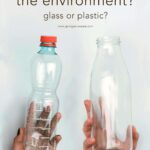



Definitely food for thought. Thanks!
I’ve been wondering about this for awhile, I’ve imposed a limit of not charging my phone more than once per day. I’m looking to do the same with my laptop and using natural daylight to get as much done as possible so i only have one light on in the evenings.
my energy supplier has certainly noticed, this month they owed me money.
Wow that’s awesome! Do you have solar panels? I can’t believe they owe you money!
No solar panels yet i’ve only been in the house 4 months but give me time. They bill based on your expected energy usage from previous months, and we are well under this month.
I was thinking about investing in a solar charger for the house in the short term for charging phones and laptops, just need to do some research.
Wow this post makes me reconsider a lot. A couple of weeks ago I deleted like 30GB of data from Dropbox and deleted like a thousand emails because I wanted to clear things out for the new year and to move my data somewhere else. It feels good to get rid of all of the excess clutter, but I was surprised by how much data was left, especially since I consider myself more of a minimalist than a hoarder. Looks like I should cut back even more. I just never really thought about it.
I guess the alternative is to maintain your own data? I switched our house to 100% green energy though my utility provider so now I try to do everything at home. This would be one more thing that I could just do for myself.
This is 3 years old, but I just stumbled on it, so for posterity:
If you’re talking about just storing files that you access infrequently, I think maintaining them yourself is of dubious environmental value. You would need to purchase your own medium to store it, which will use more rare earth materials, and really your data should be maintained on 2 different types of storage media, each in different locations (one at your house and one off-site). You also need to regularly check the storage media to ensure it is still viable, and update it on a regular basis, because tech doesn’t last forever even when you’re not using it.
Storing files isn’t as resource intensive as constantly retrieving them across the world. So it may have some benefit to things like music and movie streaming.
I would wager for all the time and energy it would require to maintain data storage yourself, it would do more good long term to regularly contact your cloud storage service asking what they are currently doing to reduce their impact, and encouraging them to do better. Or regularly checking to see if there are any new companies that provide the same service with less impact. Or better still, making phone calls to your political representatives asking them what they are doing to push the issue forward. Phone calls to people and companies with the power to make massive changes are very high impact relative to the time and effort required to make them.
Yeah, I’m not entirely sure the solution. I mean having it on an external hardrive that you kept would probably be better. But, I’m definitely not an expert on this subject. But, it’s interesting to think about. I hope I can interview some experts in the field in the future.
Definitely very interesting to think about how much all those servers that I (for sure) use up a whole lot of energy from contribute to energy consumption. This summer I also found myself doing things like listening to albums that I own or have easy access to on Spotify without even thinking of this at all. I am now living in a country that a. my spotify doesn’t work and b. listening to music on youtube fairly regularly grinds my internet to a halt so have been opening up my itunes a lot more often. I kind of forgot how nice it was to play through albums that I’ve loved for a while. I am definitely going to load a few more onto my computer when I return home (library also a great resource for this, though I haven’t taped into their cd collections yet) as it is quite nice to run through a whole album rather than picking through stuff on youtube some times and as you pointed out is less energy intensive. Thanks for the post, got me thinking for sure! BW
I’ve been learning a lot lately about the relationship between slavery and ecocide with regards to the minerals used in all our technological devices. A vast portion of the minerals in our phones, tablets, laptops, etc. are sourced illegally from protected lands using slaves. It has taken everything mentioned in your article to a whole new level for me. The work of Professor Kevin Bales goes into great detail about this and how it relates not only to technology but many of our other must-have products. I highly recommend his book Blood and Earth. Suddenly I’m left with the dilemma – how do I continue to participate effectively in a society that relies so heavily on technology? All the more reason to re-use and re-purpose items as well as simply owning less stuff.
Wow, that really bothers me that we’re so dependent on technology that has been manufactured by extorting and mistreating people and the environment. I’m definitely going to check that book out, though I’m sure I’m going to finish it feeling thoroughly disgusted and upset.
You raise a really interesting point. When everywhere and everything is so reliant on this technology, what is an environmentally and just generally people friendly way for us to take part?
E-waste has been a big concern of mine lately and I fear for my next purchase of an electronic device, when my computer, Ipad or phone finally give up the ghost. But I have never thought about all the servers and all the energy that they need! I do believe that we will be able to convert the energy they use into a green one some day in the future, but I fear that that future is more of a distant one than a near one.
I will definitely check out this ‘Green Hosting’ stuff you linked to. Thank you for that!
You can use TabforaCause to help people when you open tabs
I’ve read quite a lot of zero waste blog posts over the past few days, and I was thinking about this earlier. Interestingly, this is the only one I’ve come across so far that’s spoken about the waste / environmental impact of technology. It sure is a problem, but I think that having read this and thought about it I will find it a lot easier to stop myself randomly scrolling through Facebook for, as you say, no gain. I’m definitely going to switch my search engine to Ecosia now, such a clever idea.
I found the Chrome extension "Nudge" to be immensely helpful for making my use of Facebook much, much more conscious and intentional:
https://chrome.google.com/webstore/detail/nudge/dmhgdnbkjkejeddddlklojinngaideac
It puts a minor barrier to my mindlessly opening websites like Facebook, hides most of the extraneous stuff, and (most importantly in my opinion) it lets you choose to automatically unfollow EVERYTHING on Facebook.
That last function is amazing. It means I have to choose to navigate to a group’s Facebook page to see what’s going on there. It means I have to reflect on which friends’ posts I want to see and then intentionally search for them.
I tried opting in for a few key friends so that my news feed would be just what I wanted… but I found that this still encouraged unconsciousness. So I’ve gone back to unfollowing literally everything, and am very glad for it.
FWIW!